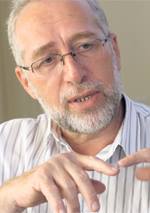Professor Valentin Bucik, Univerza v Ljubljani, Slovenija

Giftedness and creativity: Myth and Truth
Many European countries, especially the smaller ones with limited natural resources, claim that human resources are the most important national treasure and – wishing to become a society of knowledge – they promote giftedness and creativity as one of the main strategic goals in the short-term and long-term development and prosperity of the country. Paradoxically there are many countries which are not willing to spend additional substantial funds for the development programs for gifted, talented and creative individuals. In addition, the concepts of giftedness and creativity are far for clear – not only for the majority of discussants outside the frame of psychology. Several persistent stereotypes, misconceptions and myths can also be found in the field of psychological expertise. There is a number of “popular” myths, such as the opinions that creative ability is a trait inherent in one’s heritage or genes, that lefties are more creative, that children are more creative than adults, that everyone is creative, and that time pressure fuels creativity. However, a number of more serious myths also exist: that gifted education programs are elitist, that differentiation in the regular classroom is equivalent to gifted programs and is sufficient, that teachers challenge all the students, so gifted kids will be fine in the regular classroom, that gifted students make everyone else in the class smarter by providing a role model or a challenge, that the gifted and talented constitute one single homogeneous group and giftedness is a way of being that stays in the person over time and experiences. Moreover, some think that giftedness equals a high IQ, which is supposedly a stable measure of aptitude, that creativity is too difficult to measure, that high-ability students don’t face problems and challenges, so it is fair to teach all children the same way, etc. Is intensive stimulation of a child’s brain very early in the development really crucial? Is kindergarten really too late? Does school really kill creativity? Are education and creativity in art really nothing but “art for art’s sake”? Recent studies show that there are even more stereotypes about giftedness and creativity nowadays than three decades ago. The presentation will use viewpoints of different studies to focus on some of those myths and their possible perniciousness for the development of the individual child and also for the society.
Valentin Bucik studied psychology (and reached PhD in 1993) at University of Ljubljana, Slovenia. He works as Full Professor for psychological methodology at the Department of Psychology, Faculty of Arts, University of Ljubljana. He was head of department, vice-dean and dean of the faculty, serving two terms. He teaches different courses at all three levels of study of psychology in Ljubljana, including Research methodology, Multivariate data analysis, Test theory, Applied psychometrics and Intelligence, giftedness and creativity. He was a visiting professor or invited lecturer at state universities in Sarajevo, Zagreb, Graz, Trier, Bratislava and Zürich. For the last four years he is a trustee of all three cycles of psychology studies (and visiting professor) at the University of SS Cyril and Methodius in Trnava, Slovak Republic. He was one of the associate editors of the European Journal of Psychological Assessment and secretary general of the European Association of Psychological Assessment, and is member of the International Society for the Study of Individual Differences and the International Society for Intelligence Research. He served as chair of the National Committee for Matura (2004-2008) and is a member of the committee from 1998. He is also a member of Expert group for gifted education at the National education institute of the Republic of Slovenia. His main research areas are psychological methodology, psychological testing, test construction and adaptation, and different areas of differential psychology (structure of intelligence, the role of speed-of-information processing in g, relationship between intelligence, temperament and personality structure), as well as methodological problems of standardized knowledge assessment and examination in schools, tracking the standards of quality in school and educational system evaluation. Lately he is focused on different models explaining giftedness and is particularly interested in the relationship between giftedness and creativity and in the impact that creativity (especially in arts) has on the development, education and academic efficacy in children and youth.



